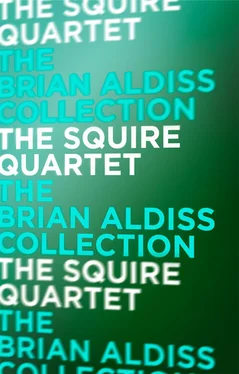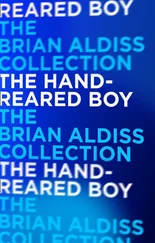‘Your complaint is mine, Jacques. He’s only an unimportant critic in a small department in Bucharest University. Had he been Arthur Koestler, let’s say, I would have deferred to him. But Koestler would not have spoken as this man did.’
‘All the same, you mustn’t exactly blame him, you know, for the sins of his government. We’d really all be in the soup if that—’
‘Jacques, old chum, pass me over the rolls, will you, and let me enjoy my breakfast. I had no intention of upsetting your apple-cart, and actually I am sorry I broke out as I did.’
Not wishing anyone to see how upset he was by this episode, he retired to his bedroom until it was time to go down to the first session of the day at nine o’clock. He felt to blame over the Camaion affair. He knew that Camaion – a little man, as d’Exiteuil said – was personally piqued because Squire had ignored him at the opening ceremony, or had seemed to ignore him. As Squire now recollected, too late, he had encountered Camaion only a few months earlier at a seminar in Paris. He had forgotten the man’s face. His bad memory was at fault. In fact, during the Paris occasion, Camaion had made complimentary remarks in public concerning Squire’s work.
At the recollection, a rare blush of shame crept to his cheeks. Some people, and by no means the most contemptible, feel slights very keenly.
From what Squire had been told, in words that now came back clearly, Geo Camaion was quite a brave man. Moreover, Squire had said insulting things about Romania. No matter that they were true. Romania was one of the most authoritarian regimes in the Eastern bloc, yet Squire admired President Ceaucescu’s independent stand against Soviet domination. Even at an unimportant conference like this, for Romania to suffer any disgrace could always be seized on in some way by her enemies, of which she had many; or Camaion himself could find his position undermined, and perhaps a worse man set in his place.
A few minutes of thought persuaded Squire that he should apologize to the Romanian as soon as possible.
When he went downstairs, the foyer was already filling with delegates, many of them indulging in a last smoke before entering the conference hall. By covert glances, by gazes hurriedly switched elsewhere as they encountered his, Squire saw that news of the exchange at the breakfast table was spreading, had spread.
Herman Fittich, a rolled newspaper under his arm, came up cheerfully and said, ‘I learn that you have been putting some of our socialist friends to rights this morning. I can’t say I found that titbit of news entirely depressing.’ He made it plain by his manner that he did not intend to refer to the photograph of Pippet Hall he had produced the previous evening.
Squire smiled uneasily. ‘The Romanian called me insular. As one who lives on an island, I’m bound to resent the remark, just as liars hate being called liars.’
‘Or communists communists. I wouldn’t have said people practised living on islands, the way other people practise lying or practise communism. You can live on an island and do other things, whereas if you are a liar or a communist, it’s pretty well a full-time occupation.’
Squire smiled again, this time with real humour. ‘Then again, if you live on an island, you can stop it just by catching a plane.’
‘That’s because we have yet to invent airlines which will fly you from moral turpitude.’ They both began to laugh, walking together into the conference hall. ‘Moral Turpitude – sounds like rather a nice little place, perhaps a desert island in the New Hebrides, named after Sir Harry Turpitude of His Majesty’s Navy.’
Slowly, the delegates took their allotted places. Some paused to scrutinize themselves in the tall gilded mirrors, perhaps on the watch for falsehood. Squire sat and chatted to Rugorsky, his neighbour on his left. To his right, d’Exiteuil and Frenza talked together with their heads close, breathing cigarette smoke at each other. Frenza now wore a jacket over his silk sweater. The Ermalpan delegates settled along the left-hand side of the conference room, as neat as a row of starlings perching on a fence. Carlo Morabito was among them.
At ten minutes past nine, d’Exiteuil rose. Smiling and gesticulating, he made a few general announcements before handing over to Frenza. Frenza removed his heavy spectacles and looked round the room, his face set as if he had something unpleasant to announce. Instead, he made a semi-private joke about the drinking habits of the hotel manager, and the delegates laughed and relaxed, twitching at ties and pens. Frenza then introduced the first speaker of the morning’s session, Professor Georgi Kchevov. Frenza said that perhaps the most remarkable feature of this, the First International Congress of Intergraphic Criticism, was the way in which it had been possible to receive contributions from both the West and the East. He felt that this represented a genuine drawing together in the brotherhood of nations, and that here in this congress they could symbolize, among their other important business, a growing unity and understanding and unionism worldwide. He was more than pleased to introduce Professor Georgi Kchevov to address them.
Fittich shot Squire a look across the table while this speech was in progress. It was usual for the chairman to introduce each speaker with a brief listing of their credentials, their institution, their previous contributions, their specialization. Kchevov evidently had no credentials of this kind.
Whilst Frenza talked, Kchevov polished his gold-rimmed spectacles. He rose now, putting them rather awkwardly in place, and then picked up his papers. He smiled at everyone and began to address the assembly in resonant Russian. Squire took note of this; on more than one occasion outside the conference hall, he had overheard Kchevov talking perfectly fluent Italian. But presumably it was politic that Russian should be heard officially at the conference. It seemed to present the interpreters with some problems. A full minute after Kchevov had begun his oration, the female voice of the interpreter came over the headphones, speaking with a hesitancy which in no way matched what Kchevov was saying.
‘Yes, accordingly, on the present problems before us – facing us, I should say – I can bear in mind the remark of Delegate Thomas Squire that we in fact explore the familiar, so to say. That’s the hope to come up to – with a different picture than the one that we had before.
‘We must look ahead concisely, and without being merciful. It’s enough to know that many things will not be, where for instance people are exploited with bare bread. They stand in rows now. We can’t decide. We have decided. Only the collapse awaits. Leading countries are condemned.
‘Many new things will be born. We must decide. We must deal with optimism and only with optimism. I could criticize what has gone previously in this respect, but want only to shed light on the matter, and so refrain in a rather brotherly or fraternal spirit, like a blow on the right place. Shoulder.
‘We must not, we should not accuse the pessimism piled in literature whose function is in respect of human problems conveyed in past times, since we now understand better. For instance, I must state in the sociology and political sphere were economics. From all these comes the evolvement of new literature and tokens beyond the word printed. Even to the personality of affairs. Such we may presume to call nowadays in a sense scientific.
‘People who are among us and live with us influence the course of events, of course, which is not far in the future. We must not go to bed with them tonight. Orthodoxy of the state can guide us. So we’re not able to take a bus to anywhere which is not painted on a card. Sorry, printed in the map. I’m sorry, but that means to concern all of us. The chairs in this hall are, in a sense, filled right up with all human beings.
Читать дальше












